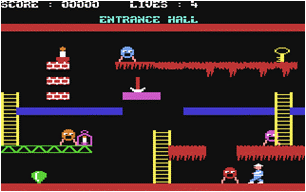Some thoughts from the Bad Games Panel I participated in at the DiGRA conference last month. My co-panelists were Jason Begy, who presented We’ll get through this together: Bad Games and Social Settings and Matthew Weise who presented on Bad Games – Just Like Bad Movies. An Example of Paracinematic Practice in Game Culture.
The Possibility of Paragaming
In the panel, we discussed the possibility of enjoying games that are considered “bad”, or low quality according to whatever criteria we use. We could call this paragaming, following the idea of paracinema discussed below. (The films of Ed Wood are probably the best known examples of paracinema.) Paragaming, on the other hand, has gained little recognition, but it does exist once you start looking.
We chose two quite straightforward starting points:

1) Susan Sontag’s classic 1964 essay Notes on ‘Camp’, in which she identifies camp:
“Not only is there a Camp vision, a Camp way of looking at things. Camp is as well a quality discoverable in objects and the behavior of persons. There are “campy” movies, clothes, furniture, popular songs, novels, people, buildings. . . .“
<- This is a Tiffany Lamp, which Sontag says is part of the Camp canon.
 2) Jeffrey Sconce’s 1996 article ‘Trashing’ the academy: taste, excess, and an emerging politics of cinematic style in which he discusses (among other things) paracinema, a kind of (alleged) subversive inversion of the taste hierarchy of film. In which he writes about the paracinematic audience:
2) Jeffrey Sconce’s 1996 article ‘Trashing’ the academy: taste, excess, and an emerging politics of cinematic style in which he discusses (among other things) paracinema, a kind of (alleged) subversive inversion of the taste hierarchy of film. In which he writes about the paracinematic audience:
“… this audience would be more inclined to watch a bootlegged McDonald’s training film than Man with a Movie Camera, although, significantly, many in the paracinematic community would no doubt be familiar with this more respectable member of the avant-garde canon.”
Choosing the Flawed Clone over the Perfect Original
With that, the questions become:
- How can we enjoy games that we consider “bad” according to a given taste?
- What is the taste against which we can rebel by playing games hitherto considered unworthy of playing?

An example: China Miner, above, is a ridiculously hard 1984 Commodore 64 game. Hard to the point where it is certain that nobody every completed the game’s 40 levels without resorting to some sort of cheat mechanism. In fact, I find it unlikely that anybody even completed the first five levels without using cheats. (The game didn’t come with cheat codes – cheats had to be created by disassembling and modifying the game, which I personally spent a good deal of time doing.)
If you haven’t heard of China Miner before, it’s probably because it is a low-quality clone of the classic game Manic Miner. Manic Miner revolutionized the platform game with its zany British humor and intricate level design. Manic Miner is clearly a good game, by any standard. You would then be likely to think that Manic Miner was more enjoyable than China Miner… but it isn’t. Playing Manic Miner is drudgery, a game that falls neatly within the boundaries that it has set for itself.
China Miner, on the other hand, is exhilarating, a game that creates wow moment after wow moment. I have had much more enjoyment playing China Miner than I have had playing Manic Miner. Where Manic Miner is perfect at what it tries to do, China Miner is a radically flawed copy. But its flaws makes it interesting, open to discussion, it makes you want to find yet another incredibly bad game design decision, to show the game to new people who haven’t seen it. I much prefer this flawed clone to the perfect original.
What is there to Rebel Against?
This elaboration of the enjoyable qualities of China Miner is an example of such paragaming: The game fails by a number of the criteria that we tend to take for granted, but that is exactly why it is so enjoyable. Here is a list of quality criteria that the game fails to live up to:
- Don’t break control conventions without reason [possible the only game ever where jumping requires pressing up and pressing fire].
- Don’t kill player within the first few seconds.
- Have sound [only sound is a looping rendition of a ragtime tune].
- Difficulty curve should be a rising slope. [Some subsequent levels easier than level 1].
- Save expert moves for later levels.
- Don’t let players make early mistakes that are only apparent much later.
- It should be possible to complete a game.
So what I have done here is to rebel against the taste of Good Game Design. Here, then, is what a short manifesto of paragaming could look like:
We all know that games should have reasonable interfaces, good learning curves, worlds that make sense on some level, player feedback, and so on. But you know what, screw that! Give me unreasonable games that don’t work, that defy conventions, that require me to squint at horrible graphics, to cringe at looping music, to fight against illogical interfaces, and to seriously consider what I am doing: real games, really bad games.

Great summary Jesper. But given your position in the field, you could conceivably be construed as a tastemaker. If people follow (y)our example and start playing bad games, is it still paragaming? Or if you defend a bad game as good, is a good game now bad? Regardless this is also a great example of the problems around the word “fun.”
Well regardless, I too find myself looking forward to awful games much more so than “good” games.
Jason,
Ah, yes, that is a conundrum. I think that if we were so influential that we could convince everybody that China Miner really is The Good Stuff, then paragaming would involve playing BioShock and Shadow of the Colossus. I don’t think we are quite there, fortunately…
Maybe some day; keep trying!
Does a big “buggy” game count in what you define as “bad game” ? I mean a game that is so full of bugs that the gameplay turns into random effects and mistreats the player.
S.,
The idea is not that I would tell you whether a game is bad. But certainly most people tend to subscribe to an idea of game quality according to which games should be bug-free.
To be able to “paragame” it is then a little more complicated. At DiGRA, Jason Begy talked about group enjoyment of Big Rigs: Over the Road Racing, a game which is certainly very buggy – and enjoyable for it.
There are other types of bugs that would make it hard to enjoy paragame a game – if the game doesn’t load, for example.
Jesper, I think you’ve introduced a really interesting concept here. A few things have occurred to me regarding the concept – Sconce discusses paracinema as a counter canonical viewing practice, do you see paragames as a practice and if so how does this differ from regular gaming? Is this a difference between gaming and playing – ludus and paideia?
Sconce’s paper contains a few tongue-in-cheek quotes from online communities citing the wonder of wooden acting, bad continuity, awful dialogue and ultimately the connection they feel with bad artists. Do you feel such connection with bad game makers? What do you see as the pleasures of bad games?
Another question is that Paracinema is largely a community based group, they’re anti-industrial standards – have you found any counter canon game culture?
On a slightly different note the article reminded me of Takeshi’s Challenge designed by Takashi Kitano, while I’ve never played the game, it often gets discussed as one of the worst games of all time and it would violate a few of your rules above. Though at the same time it has been argued to introduce new ways of looking at gaming. The value of bad games?
Mike,
I think paragaming is quite similar to paracinema, with the exception that paracinema rebels against “good taste”, whereas video games are often considered “bad taste” by themselves. What I described here was a way of enjoying games counter to “good taste” within game culture, so in that sense paragaming is different from paracinema: we lack the established graybeards whose taste we can rebel against!
I haven’t seen anyone feeling a connection with “bad game developers”, though I don’t see any reason why you wouldn’t. I do have a blog post in the works about Ian Gray who wrote China Miner.
no talk at all of the modern scene?
http://www.glorioustrainwrecks.com/ being a most obvious example
I do like the insight that all games are essentially camp when viewed from a broader perspective. Also like the Greek words; they have a campy flavor.
ijih, wow, thanks for the link. I must admit that I was not aware of this site.
You go as far as calling it a scene? Sounds good!
I really like this concept of paragaming. I see it related to Alexander Galloway’s notion of the countergame. That is, games that are intentionally bad and made to be played in a paragaming state of mind — like Jason Nelson’s work — are countergames, which expose our expectations of what counts as “fun.”
Check out Cina Miner here:
http://revver.com/video/401556/electronic-agony-china-miner-part-1-commodore-64/
That guys hould get some award for patience…
Mats, ah yes – I saw that one. It’s a good alternative to playing the game, but I think one should do both!
I’ve got it running on CCS64 now. It’s hard…
You mention China Miner the c64 game ,this brings back memories for me . This was the very First computer game i ever bought (along with revenge of the mutant camels).
I played it for at least 4-8 hours every day for weeks on end .I never manage to complete the game but I managed to get to about level 30 (without any cheats whatsoever) . Probably the most challengingly hard game ever made and that was probably one of the reasons i kept going back to try and complete it for so long .
Kev,
I recall getting stuck in a level called “The Music Room” (and that was _with_ cheats). Do you think it is unfair to call it a “bad game”?
Yep .I think it is unfair to call it a bad game just because it’s
almost impossible to complete (I say “almost” because i believe there
are a few people who claim to have completed it to the end.)
If say it was only a 20 level game instead of 40 then I think the game would have been the perfect difficulty for most gamers.
In fact I remember the reviews of this game in the gaming mags of the
time ,they all gave it great reviews and top marks with 8/10 or 80%+
scores .Yep a great game if youve got the time and are looking for a hard challenge .:)